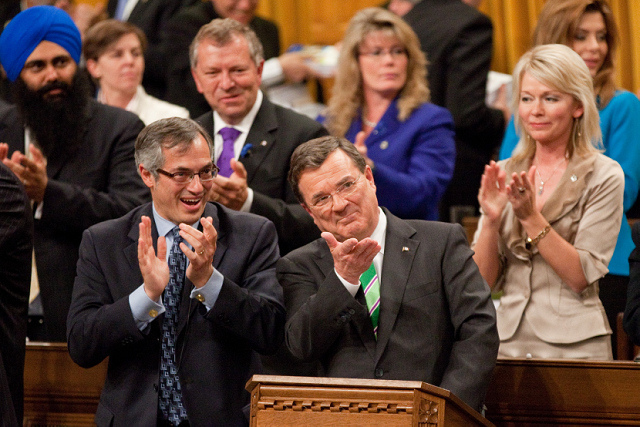With Joe Oliver replacing Jim Flaherty as Finance Minister, the debate over income-splitting is as dead as Monty Python’s parrot. The outcome, in truth, was never much in doubt. The sides were completely uneven. On the one side, Mr. Flaherty plus every economist in the known world plus most of the media plus anyone who could add. On the other: Stephen Harper and Jason Kenney. It was no contest.
Remember that in the 2011 election, the PM pledged to introduce income-splitting for couples with children once the budget was balanced. By a happy Harper coincidence, this will happen just in time for the 2015 election. So, as this newspaper summed it up last week, for a cost of some $3-billion to the public purse, there’ll be “a big tax cut to a small minority of upper-income couples with one parent in the top tax bracket and the other parent with little or no income. The vast majority of Canadians, in contrast, would see little or no benefit.” The Globe wondered how smart it was to use “a middle-class majority’s taxes to lower the tax burden on an upper-income minority.” But that’s Harperland for you.
The political drama began when Mr. Flaherty publicly mused that the plan needed “a long, hard analytical look” since it “benefits some part of the Canadian population a lot and other parts…virtually not at all.” This was passing strange since most of us took it for granted that the Minister of Finance would have analyzed and approved the plan before the PM announced it.
Still, it was obvious income-splitting was kaput. Surely the Finance Minister would never have repudiated such a major policy without the Boss’s approval? That certainty lasted for barely a moment, until Jason Kenney allowed that he actually thought income-splitting was just tickety-boo. This was very big. As a leading threat to replace Mr. Harper when the time comes, Kenney is no one to be trifled with. He is, after all, the man who cheekily declared his moral support for ex-chief-of-staff Nigel Wright after the PM had thrown Mr. Wright under a Rideau Street bus.
Sad to relate, income-splitting was not the only conflict between two of Stephen Harper’s most senior ministers. Suddenly the great dividers were greatly divided. Last December, Jason Kenney called on Rob Ford to resign, even though Mr. Ford has been a close political and fishing pal of Stephen Harper’s and a dear old family friend of Jim Flaherty’s. Mr. Flaherty didn’t appreciate Mr. Kenney’s sensible but gratuitous statement one little bit and thought he’d better clear the air one afternoon when both men were in the House. As the CBC reported, “In a voice loud enough for several of their cabinet colleagues to hear, Flaherty told Kenney to ‘shut the f–k up’ about Ford. Kenney responded angrily in kind….’I thought they might come to blows,’ said one MP.”
What their boss thought about this curious public display on his front bench no one knows. But his view of income-splitting left nothing to the imagination. Mr. Kenney had succinctly described it as “tax fairness.” Mr. Harper’s two pithy words were “excellent policy.” That means that even though economists and public policy maven from coast to coast and from right to left overwhelmingly agree it’s a terrible policy, it’s really an excellent policy.
After all, under Mr. Harper’s plan the richest 5 per cent of Canadian families, those making over $147,000 a year, would receive an annual benefit of $1,100. Ten per cent of this group would gain more than $5,000. 86 per cent of all families would get nothing whatever. What can that be called other than excellent policy?
This week in the House, Finance Minister Oliver played coy about his own position. But really, given his zealous loyalty as natural resources minister to the PM’s obsession with oil and pipelines, that’s just silly. He’s for it. Income-splitting, discredited as it is, will be part of the Conservatives’ 2015 election platform.
For those who watch politics for its insights into human nature (many of them alas disheartening), Stephen Harper and his henchmen are endlessly fascinating. The PM famously threw Nigel Wright under a bus. As finance minister, Jim Flaherty repeatedly threw Liberal Ontario under a bus (Ontario was “the last place” in Canada to make a new business investment, its credit rating deserved to be downgraded, and its fiscal mismanagement made it “a problem for the entire country).” Joe Oliver, as Natural Resources minister, threw much of the environmental movement under that same bus. Jason Kenney did the same to the exemplary church-backed NGO, KAIROS, slandering it as anti-Semitic. And don’t even ask what they all did to poor old democracy.
So why can’t they similarly terminate ill-considered policies and practices opposed by a virtually united nation — the long-form census, omnibus bills, and now the Fair Elections Act and income-splitting? Hey, that’s Harperland for you.
This article orginally appeared in The Globe and Mail.
Image: flickr/webpmphotos



